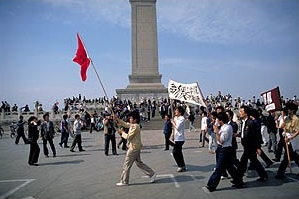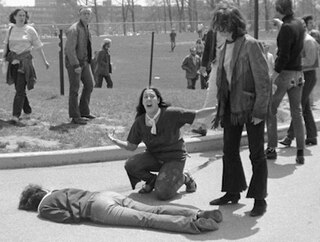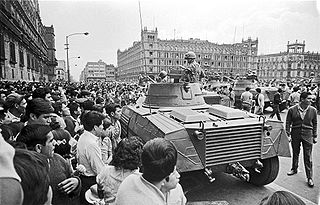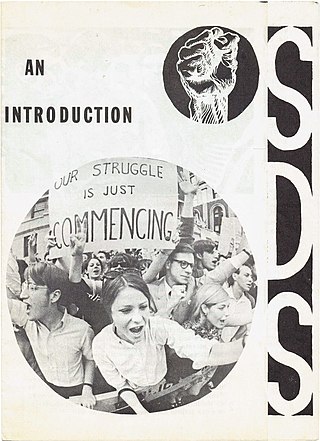
Student riots, college riots, or campus riots are riots precipitated by students, generally from a college, university, or other school. Student riots are often an aspect of student protests.

Student riots, college riots, or campus riots are riots precipitated by students, generally from a college, university, or other school. Student riots are often an aspect of student protests.
As with riots in general, the causes are varied.
Student riots have often been political in nature, such as those that were common in the US and Western Europe during the Vietnam War era. Student riots in China during 1989 arose when the students started protesting against the injustice of their politicians. In a number of countries, such as Mexico, Chile, Iran, Venezuela and Bangladesh, students form an active political force, and student riots can occur in the context of wider political or social grievances. [1] [2] On some occasions student riots have accompanied a general strike, a student strike, or wider national protests.
Student riots have also been seen as hooliganism—such as after sporting events—with some in the US being linked to alcohol consumption. [3]
Responses to riots are also varied. In response to student riots in China during 1989, the Chinese government opposed the protests and brutally beat and murdered those who participated in them.
The following are some examples of famous student riots:

The Tiananmen Square protests, known in China as the June Fourth Incident, were student-led demonstrations held in Tiananmen Square, Beijing, China, lasting from 15 April to 4 June 1989. After weeks of unsuccessful attempts between the demonstrators and the Chinese government to find a peaceful resolution, the Chinese government declared martial law on the night of 3 June and deployed troops to occupy the square in what is referred to as the Tiananmen Square massacre. The events are sometimes called the '89 Democracy Movement, the Tiananmen Square Incident, or the Tiananmen uprising.

A protest is a public act of objection, disapproval or dissent against political advantage. Protests can be thought of as acts of cooperation in which numerous people cooperate by attending, and share the potential costs and risks of doing so. Protests can take many different forms, from individual statements to mass political demonstrations. Protesters may organize a protest as a way of publicly making their opinions heard in an attempt to influence public opinion or government policy, or they may undertake direct action in an attempt to enact desired changes themselves. When protests are part of a systematic and peaceful nonviolent campaign to achieve a particular objective, and involve the use of pressure as well as persuasion, they go beyond mere protest and may be better described as civil resistance or nonviolent resistance.

Student activism or campus activism is work by students to cause political, environmental, economic, or social change. In addition to education, student groups often play central roles in democratization and winning civil rights.
A teach-in is similar to a general educational forum on any complicated issue, usually an issue involving current political affairs. The main difference between a teach-in and a seminar is the refusal to limit the discussion to a specific time frame or a strict academic scope. Teach-ins are meant to be practical, participatory, and oriented toward action. While they include experts lecturing on their area of expertise, discussion and questions from the audience are welcome, even mid-lecture. "Teach-ins" were popularized during the U.S. government's involvement in Vietnam. The first teach-in, which was held overnight at the University of Michigan in March 1965, began with a discussion of the Vietnam War draft and ended in the early morning with a speech by philosopher Arnold Kaufman.

Opposition to United States involvement in the Vietnam War began in 1965 with demonstrations against the escalating role of the United States in the Vietnam War. Over the next several years, these demonstrations grew into a broad social movement which shaped the polarizing debates of the late 1960s and early 1970s on American involvement in the Vietnam War.
In 1968, a series of protests at Columbia University in New York City were one among the various student demonstrations that occurred around the globe in that year. The Columbia protests erupted over the spring of that year after students discovered links between the university and the institutional apparatus supporting the United States' involvement in the Vietnam War, as well as their concern over an allegedly segregated gymnasium to be constructed in the nearby Morningside Park. The protests resulted in the student occupation of many university buildings and the eventual violent removal of protesters by the New York City Police Department.

The protests of 1968 comprised a worldwide escalation of social conflicts, which were predominantly characterized by the rise of left-wing politics, anti-war sentiment, civil rights urgency, youth counterculture within the silent and baby boomer generations, and popular rebellions against state militaries and bureaucracies.

Campus protest or student protest is a form of student activism that takes the form of protest at university campuses. Such protests encompass a wide range of activities that indicate student dissatisfaction with a given political or academics issue and mobilization to communicate this dissatisfaction to the authorities and society in general and hopefully remedy the problem. Protest forms include but are not limited to: sit-ins, occupations of university offices or buildings, strikes etc. More extreme forms include suicide such as the case of Jan Palach's, and Jan Zajíc's protests against the end of the Prague Spring and Kostas Georgakis' protest against the Greek junta of 1967–1974.

As an act of protest, occupation is a strategy often used by social movements and other forms of collective social action in order to squat and hold public and symbolic spaces, buildings, critical infrastructure such as entrances to train stations, shopping centers, university buildings, squares, and parks. Opposed to a military occupation which attempts to subdue a conquered country, a protest occupation is a means to resist the status quo and advocate a change in public policy. Occupation attempts to use space as an instrument in order to achieve political and economic change, and to construct counter-spaces in which protesters express their desire to participate in the production and re-imagination of urban space. Often, this is connected to the right to the city, which is the right to inhabit and be in the city as well as to redefine the city in ways that challenge the demands of capitalist accumulation. That is to make public spaces more valuable to the citizens in contrast to favoring the interests of corporate and financial capital.

The Kent State shootings were the killing of four and wounding of nine unarmed college students by the Ohio National Guard on the Kent State University campus. The shootings took place on May 4, 1970, during a rally opposing the expanding involvement of the Vietnam War into Cambodia by United States military forces as well as protesting the National Guard presence on campus and the draft. Twenty-eight National Guard soldiers fired about 67 rounds over 13 seconds, killing four students and wounding nine others, one of whom suffered permanent paralysis. Students Allison Krause, 19, Jeffrey Miller, 20, and Sandra Scheuer, 20, died on the scene, while William Schroeder, 19, was pronounced dead at Robinson Memorial Hospital in nearby Ravenna shortly afterward.

The Mexican Movement of 1968, also known as the Mexican Student Movement was a social movement composed of a broad coalition of students from Mexico's leading universities that garnered widespread public support for political change in Mexico. A major factor in its emergence publicly was the Mexican government's lavish spending to build Olympic facilities for the 1968 Olympics in Mexico City. The movement demanded greater political freedoms and an end to the authoritarianism of the PRI regime, which had been in power since 1929.

The nationwide student anti-war strike of 1970 was a massive outpouring of anti-Vietnam War protests that erupted in May of 1970 in response to the expansion of the war into neighboring Cambodia. The strike began on May 1 with walk-outs from college and high school classrooms on nearly 900 campuses across the United States. It increased dramatically following the shooting of students at Kent State University in Ohio by National Guardsmen on May 4. While a number violent incidents occurred during the protests, for the most part, they were peaceful.
The 1960s Berkeley protests were a series of events at the University of California, Berkeley, and Berkeley, California. Many of these protests were a small part of the larger Free Speech Movement, which had national implications and constituted the onset of the counterculture of the 1960s. These protests were headed under the informal leadership of students Mario Savio, Jack Weinberg, Brian Turner, Bettina Aptheker, Steve Weissman, Art Goldberg, Jackie Goldberg, and others.

Students for a Democratic Society (SDS) was a national student activist organization in the United States during the 1960s and was one of the principal representations of the New Left. Disdaining permanent leaders, hierarchical relationships and parliamentary procedure, the founders conceived of the organization as a broad exercise in "participatory democracy". From its launch in 1960 it grew rapidly in the course of the tumultuous decade with over 300 campus chapters and 30,000 supporters recorded nationwide by its last national convention in 1969. The organization splintered at that convention amidst rivalry between factions seeking to impose national leadership and direction, and disputing "revolutionary" positions on, among other issues, the Vietnam War and Black Power.

An anti-war movement is a social movement, usually in opposition to a particular nation's decision to start or carry on an armed conflict. The term anti-war can also refer to pacifism, which is the opposition to all use of military force during conflicts, or to anti-war books, paintings, and other works of art. Some activists distinguish between anti-war movements and peace movements. Anti-war activists work through protest and other grassroots means to attempt to pressure a government to put an end to a particular war or conflict or to prevent it in advance.
A revolutionary wave is a series of revolutions occurring in various locations within a particular timespan. In many cases, past revolutions and revolutionary waves have inspired current ones, or an initial revolution has inspired other concurrent "affiliate revolutions" with similar aims. The causes of revolutionary waves have become the subjects of study by historians and political philosophers, including Robert Roswell Palmer, Crane Brinton, Hannah Arendt, Eric Hoffer, and Jacques Godechot.